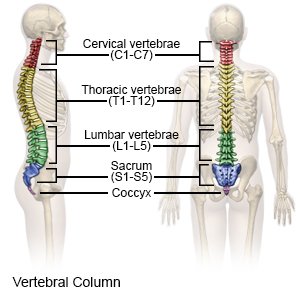Kyphoplasty
Medically reviewed by Drugs.com. Last updated on Aug 4, 2025.
Kyphoplasty is a procedure to fix broken vertebrae.
 |
How do I prepare for the procedure?
- Your healthcare provider will tell you how to prepare. He or she may tell you not to eat or drink anything after midnight on the day of the procedure. Arrange to have someone drive you home when you are discharged.
- Tell your provider about all medicines you currently take. He or she will tell you if you need to stop any medicine for the procedure, and when to stop. He or she will tell you which medicines to take or not take on the day of the procedure.
- You may need blood tests before your procedure. You may also need x-rays, a CT scan, or an MRI of your spine.
What will happen during the procedure?
- You may be given general anesthesia to keep you asleep and free from pain. Local anesthesia may instead be injected into your back. It is used to numb the area and dull the pain. You may still feel pressure or pushing during the procedure.
- Your healthcare provider will make a small incision over your broken vertebrae. A balloon will be inserted near the broken vertebrae and inflated to make a pocket. The balloon will be removed and bone cement will be injected into the pocket. The hardened cement will help keep your broken vertebrae together so it can heal.
- A bandage will be placed over the procedure site. Your healthcare provider may do an x-ray or CT scan to check for any leaks.
What should I expect after the procedure?
You will be taken to a room to rest until you are fully awake. Healthcare providers will monitor you closely for any problems. Do not get out of bed until your healthcare provider says it is okay. When your healthcare provider sees that you are okay, you will be taken to your hospital room.
- You will lie flat until the cement fully hardens.
- Medicine may be given to prevent or relieve pain.
What are the risks of kyphoplasty?
You may have an allergic reaction to the bone cement. Your nerves and spinal cord may be damaged. Spinal cord damage may cause you to leak spinal fluid. This can cause paralysis. You may be bruised or get an infection after the procedure. Vertebrae that are near the procedure area may break. Cement may leak into your spinal cord, kidneys, and blood vessels. Cement leaks may travel into your lungs and brain. This can be life-threatening.
DISCHARGE INSTRUCTIONS:
Related medications
Call your local emergency number (911 in the US) if:
- You have sudden trouble breathing or chest pain.
- You are not able to move one or both of your arms or legs.
Seek care immediately if:
- You have sudden trouble swallowing.
- You cannot think clearly.
- You have severe pain.
- You are urinating less than usual, or not at all.
Call your doctor or orthopedist if:
- You have sudden pain in your ribs or lower back.
- You have worsening pain, even after you take medicine.
- Your wound is red, swollen, or draining pus.
- You have a fever.
- You have questions or concerns about your condition or care.
Medicines:
You may need any of the following:
- Prescription pain medicine may be given. Ask your healthcare provider how to take this medicine safely. Some prescription pain medicines contain acetaminophen. Do not take other medicines that contain acetaminophen without talking to your healthcare provider. Too much acetaminophen may cause liver damage. Prescription pain medicine may cause constipation. Ask your healthcare provider how to prevent or treat constipation.
- Antibiotics may be given to prevent or treat a bacterial infection.
- Take your medicine as directed. Contact your healthcare provider if you think your medicine is not helping or if you have side effects. Tell your provider if you are allergic to any medicine. Keep a list of the medicines, vitamins, and herbs you take. Include the amounts, and when and why you take them. Bring the list or the pill bottles to follow-up visits. Carry your medicine list with you in case of an emergency.
Follow up with your doctor or orthopedist as directed:
Write down your questions so you remember to ask them during your visits.
© Copyright Merative 2025 Information is for End User's use only and may not be sold, redistributed or otherwise used for commercial purposes.
The above information is an educational aid only. It is not intended as medical advice for individual conditions or treatments. Talk to your doctor, nurse or pharmacist before following any medical regimen to see if it is safe and effective for you.
Further information
Always consult your healthcare provider to ensure the information displayed on this page applies to your personal circumstances.
